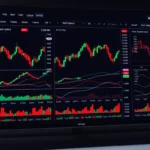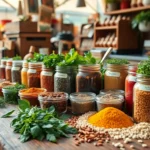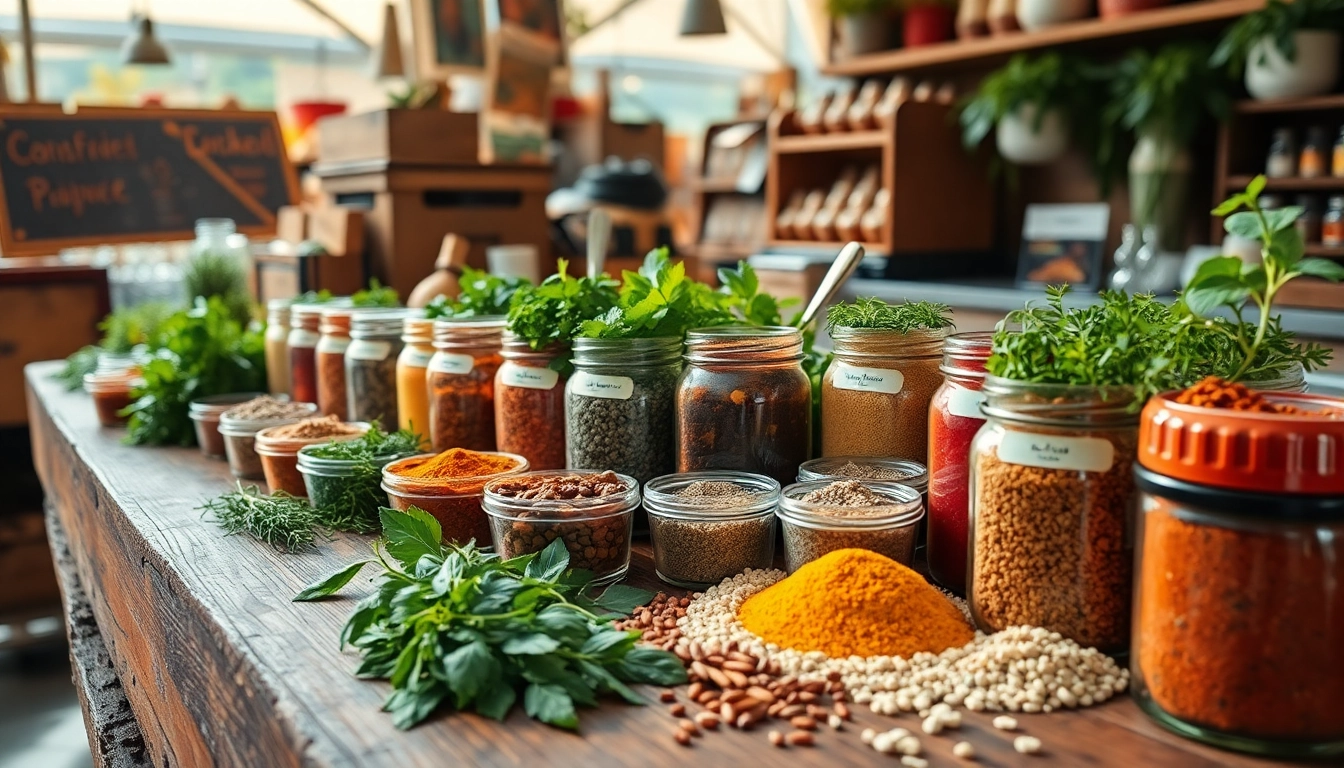Understanding the Role of Wholesalers in the Spice and Food Industry
Wholesalers serve as the vital backbone of the spice and processed foods industry, bridging the gap between manufacturers and retailers or foodservice operators. Their key functions include acquiring bulk quantities directly from producers, ensuring product quality and consistency, managing logistics and storage, and facilitating the broader distribution network. For companies like wholesalers, understanding these responsibilities is essential for optimizing supply chains and maintaining a competitive edge.
By being sourced from reputable producers, wholesalers help maintain the integrity of authentic products, such as premium spices, cooking pastes, pickles, and dehydrated foods. They also play a strategic role in influencing product availability and influencing market trends by stocking trending products like organic herbs, superfoods, and ready-to-eat items. Their ability to efficiently manage large inventories and distribute across various regions is crucial for fulfilling the demands of both small retail outlets and large food manufacturing units.
Key functions and responsibilities of wholesalers
Wholesalers in the food industry carry out several core functions. These include procurement, storage, quality control, marketing, and distribution. They often cultivate strong relationships with manufacturers—such as Spice Nest, recognized for its extensive range of authentic spices, processed foods, and dehydrated products—to secure high-quality raw materials at favorable prices.
Effective procurement involves meticulous sourcing from certified producers who meet strict standards of authenticity and safety, ensuring end products comply with national and international certifications. Storage practices are equally vital; wholesalers utilize advanced warehousing techniques to preserve freshness, especially for perishable or delicate items like garlic, herbs, or dehydrated foods. These practices prevent spoilage, contamination, and quality degradation.
Moreover, wholesale responsibilities extend to product marketing and customer relationship management. Building trust with retailers (grocery stores, hotel chains, online portals) is fundamental for long-term success. Wholesalers often participate in food expos, like Biofach, to showcase their product diversity—ranging from organic superfoods to traditional chutneys—further reinforcing market presence.
How wholesalers influence product quality and availability
Product quality is a cornerstone of a wholesaler’s reputation. By partnering with manufacturers that uphold rigorous quality standards and certifications—such as organic labels or ISO standards—wholesalers ensure their clients receive consistent and premium goods. For instance, Spice Nest’s certification and presence at major international food exhibitions position it as a trusted source for authentic spices, pickles, and ready-to-eat products.
Availability depends heavily on effective inventory management and logistics. Wholesalers analyze market demand patterns—such as rising interest in organic herbs or dehydrated foods—and adjust their stock accordingly. They also invest in reliable supply chain infrastructure to ensure timely delivery across regional and cross-border markets. This proactive approach minimizes stockouts and delays, keeping retail and foodservice clients supplied with popular products like strawberry jam, chilli garlic chutney, and mixed pickles.
Furthermore, wholesalers influence the accessibility of niche or emerging products, helping new brands penetrate markets and meet consumer preferences for health-conscious or ethnic foods.
Building reliable supplier and retailer relationships
Success in wholesale depends on cultivating trust-based relationships with both suppliers and retailers. Reliable suppliers like Spice Nest continuously innovate, ensuring the authenticity and consistency of their product ranges, including herbs, oils, and sterilized canned foods. Conversely, building a network of dependable retailers—supermarkets, specialty grocery stores, online food markets—expands the reach for wholesale distributors.
Effective communication, transparent dealings, and consistent quality are cornerstones of these relationships. For example, wholesalers often provide technical support on product usage, storage, and shelf life management to their retail partners. Participating in trade shows such as Biofach helps strengthen these connections, allowing wholesalers to stay abreast of industry trends and establish strategic partnerships.
Long-term relationships also foster collaborative marketing efforts, joint branding, and promotional activities that boost sales for both parties, particularly in high-demand segments like organic superfoods and ready-to-eat meal bases.
Choosing the Right Products for Your Wholesale Business
Top categories: spices, pastes, pickles, and dehydrated foods
Selecting the right product categories hinges on market trends, consumer preferences, and supplier reliability. Spice wholesalers should prioritize authentic spices, such as turmeric, cumin, and coriander, which are staples across cuisines. Processed categories like cooking pastes and chutneys—especially regional specialties like Rajshthani style garlic chutney—are gaining popularity among modern consumers seeking convenience without compromising flavor.
Pickles, including garlic, mixed, and fruit-based varieties, add cultural diversity and are often preferred in ethnic markets, while dehydrated foods and superfoods cater to health-conscious segments. Products like dried herbs, organic raisins, and tamarind are also in high demand for their versatility and nutritional value.
Assessing product authenticity and certifications
Authentic products with proper certifications—such as organic, ISO, and HACCP—are vital for building trust and complying with export standards. For instance, Spice Nest boasts certifications that reinforce the quality and safety of its products. As a wholesaler, verifying supplier authenticity through documentation, lab testing reports, and industry certifications ensures that the products meet national and international standards, reducing risk and boosting your reputation.
In-depth supplier audits and regular quality checks further reinforce the integrity of your offerings, making your business stand out from competitors often criticized for counterfeit or adulterated goods.
Analyzing market demand and consumer preferences
Market analysis involves tracking current trends—such as the rising demand for organic herbs, dehydrated superfoods, and ready-to-eat meals. Consumer preferences vary regionally; in India, traditional pickles and spice mixes remain popular, while urban markets increasingly seek health-oriented options like organic tamarind or gluten-free dehydrated products.
Utilizing market intelligence tools, monitoring industry reports, and attending trade expos help identify emerging needs. This insight allows wholesalers to diversify product lines proactively, aligning offerings with customer expectations and maximizing sales opportunities.
Effective Strategies for Wholesale Distribution
Streamlining procurement and inventory management
Efficient procurement involves establishing strong relationships with trusted manufacturers who can consistently deliver high-quality products. Leveraging bulk purchasing, negotiating favorable terms, and maintaining real-time inventory tracking systems help optimize stock levels. For instance, Spice Nest’s extensive product range demonstrates the importance of diversified procurement channels to avoid disruptions.
Adopting inventory management software that integrates sales data ensures visibility of stock movements, reduces wastage, and facilitates replenishment planning, crucial for perishable items like fresh herbs or garlic.
Optimizing logistics and delivery timelines
Timely delivery is a competitive differentiator. Utilizing reliable logistics partners—capable of handling temperature-sensitive and fragile items—reduces delays and quality issues. Implementing route optimization and tracking systems enhances transparency for clients and minimizes transit times. Many wholesalers also employ warehousing strategies, such as strategic regional hubs, to serve dispersed markets efficiently.
Adapting to challenges like customs clearance or pandemic-related disruptions requires contingency planning and flexible logistics arrangements.
Utilizing digital platforms for sales expansion
The digitalization of wholesale operations—through online portals, B2B marketplaces, and social media—opens new avenues for reaching distant markets. Creating a user-friendly website showcasing the full product catalog, along with secure order management, enhances customer experience. Spice Nest’s participation in international expos and their awareness through online platforms exemplify how digital tools expand market reach.
Data analytics from these platforms can identify buying patterns, enabling targeted marketing and personalized offers, ultimately boosting sales and customer retention.
Market Trends and Opportunities for Wholesalers
Emerging demand for organic and healthy foods
Consumers are increasingly seeking organic, gluten-free, and superfood options. Wholesalers who focus on certified organic products like herbs, dehydrated fruits, and oil seeds can tap into this lucrative segment. The organic industry’s growth is reflected in the success of expos and international events, where companies like Spice Nest showcase their commitment to quality and organic certification.
Positioning as a trusted supplier of authentic, health-promoting foods enhances brand credibility and allows entry into premium retail channels, supermarkets, and export markets.
Attending major food trade shows and exhibitions
Participating in events such as Biofach or FoodExpo provides exposure to global trends, new product innovations, and a network of potential clients and partners. These platforms are crucial for launching new products, understanding competitors, and gaining certifications that enhance market credibility.
Prepare comprehensive catalogues, samples, and marketing collateral to maximize engagement during these expos—a strategy successfully employed by Spice Nest at Biofach 2024.
Innovating with value-added products and packaging
Adding value through innovative packaging—such as resealable pouches or eco-friendly materials—can attract premium buyers. Developing ready-to-eat meal bases or spice mixes caters to convenience-driven consumers. Incorporating organic, gluten-free, or ethnic flavors enhances differentiation and market appeal.
Innovation combined with quality assurance ensures sustained growth in diverse markets, both domestic and international.
Measuring Performance and Ensuring Growth
Tracking sales metrics and customer satisfaction
Implementing robust performance metrics—like sales volume, client retention rates, and feedback scores—helps identify growth opportunities and areas for improvement. Regularly analyzing this data enables dynamic adjustments in product offerings and marketing tactics.
Customer satisfaction surveys and after-sales support reinforce loyalty, critical for long-term success.
Adapting to industry regulations and quality standards
Compliance with evolving regulations—such as FSSAI standards, organic certifications, and export/import rules—is essential. Staying updated through industry associations and certification bodies ensures products meet legal requirements, avoiding costly penalties and reputational damage.
Investing in quality management systems fosters continuous improvement and trustworthiness in international markets.
Expanding product lines and market reach strategies
Diversification—adding new products like dehydrated superfoods, ethnic pickles, or organic herbs—serves to capture broader market segments. Expanding geographically through targeted exports or online channels further enhances growth potential.
Collaborative marketing, participation in global trade fairs, and establishing exclusive distribution agreements provide pathways to sustained expansion.









